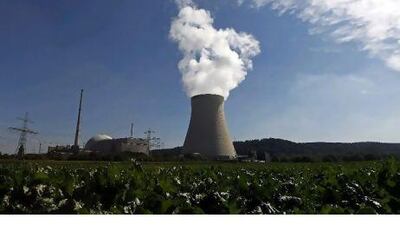Eon, Europe's largest power company, was caught off guard by the German government's headlong exit from nuclear power. It has responded with plans to cut as many as 11,000 jobs, almost 15 per cent of its workforce, in a painful restructuring that reflects the plight of the entire energy sector.
Eon, RWE, EnBW, the other top German utilities, and the German subsidiary of Sweden's Vattenfall, are starting to look like dinosaurs in danger of extinction.
Eon is active in various green power projects including the London Array offshore wind farm, in which it is cooperating with Masdar, Abu Dhabi's clean energy company. But it didn't invest soon enough, or heavily enough, in renewable energy, and relied instead on lucrative, big conventional and nuclear power stations - even though the writing had been on the wall for atomic energy in Germany as far back as 2000. Now it is paying the price for having failed to adapt to changing times.
Eon and its German peers got away with their outdated strategy and kept on raking in massive profits until March, when grainy images of smoke rising from the stricken Fukushima nuclear plant in Japan went around the world.
The public reaction in Germany bordered on hysteria, and Angela Merkel, the chancellor, proved her political canniness by swiftly reversing her controversial decision, taken only last year, to extend the lifetimes of the 17 country's nuclear plants until 2036. They will now all be shut down by 2022, broadly in line with the original date set by a previous government back in 2000.
Mrs Merkel's U-turn has proved particularly disastrous for Eon, Germany's biggest nuclear plant operator, which has stakes in nine of the plants, four of which have already been closed for good since March.
The company announced its first-ever quarterly loss this month, €382 million (Dh2.02 billion), because of first-half costs of €1.9bn associated with the nuclear exit, and announced a cost-cutting drive to save €1.5bn every year until 2015. Its share price plunged 10 per cent last week after it announced the results, and has slumped 40 per cent since the start of this year.
RWE has not fared much better. Its first-half core net profit fell 40 per cent, and it plans to respond by disposing of assets worth €8bn.
The nuclear exit will deprive Germany's big four power companies of an estimated €22bn in profits by 2022. They are now desperately seeking a new business model and, so far, have been able to come up only with radical cost cuts or divestments. The companies plan to sue the government for compensation, but have only themselves to blame.
For years, they dismissed renewables and decentralised power generation as a business for environmental dreamers. The big bucks, they believed, could be earned only with big power-generating units. When Alpha Ventus, Germany's first offshore wind farm, was opened last year, one power company executive at the ceremony reportedly remarked in private that the turbines could barely generate enough electricity to power the heat pump of his private estate.
Germany's "angst" of atomic energy has been the undoing of the big power companies. Now, with their profits in long-term decline, they will lack the resources to catch up on investments in renewable energy.
This year, Eon plans to devote €1.8bn of its investment budget to expanding wind, solar and hydroelectric power generation - just a quarter of its total investments, and far too little given the urgency with which Germany is driving its green energy revolution forward. Mrs Merkel has embarked on an ambitious plan to boost renewable power generation to 35 per cent by 2020, from 17 per cent now, and to 80 per cent by 2050.
The big companies will have no choice but to expand renewable energy production, shift from big power stations to smaller, more flexible plants, and enter into cooperation deals with local energy providers.
In short, they must finally learn to adapt. If they don't, they will perish, with unforeseeable consequences for German power generation. The country would have to kiss its green revolution goodbye, brace itself for frequent power cuts, and keep on importing electricity from French and Czech nuclear reactors.

